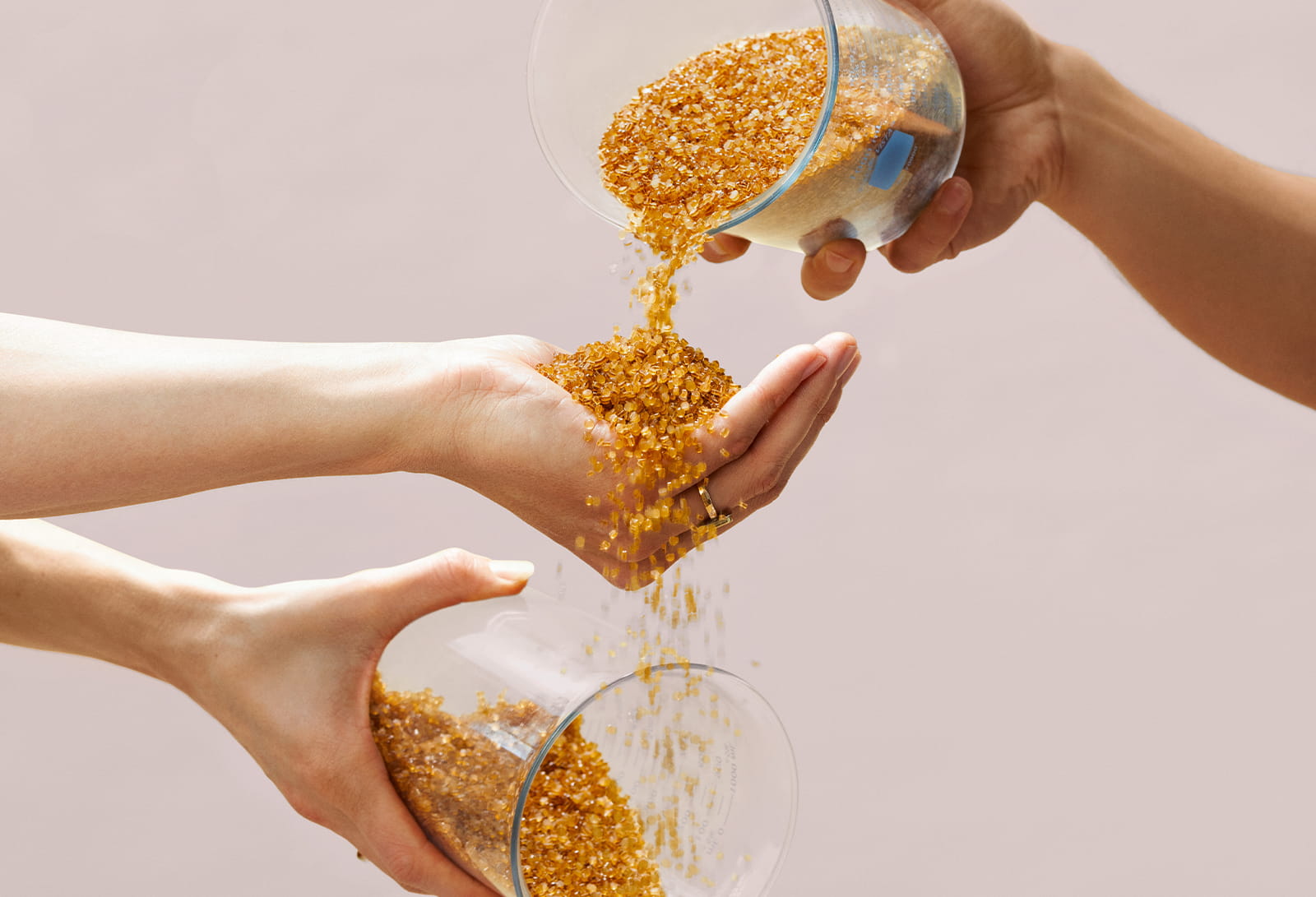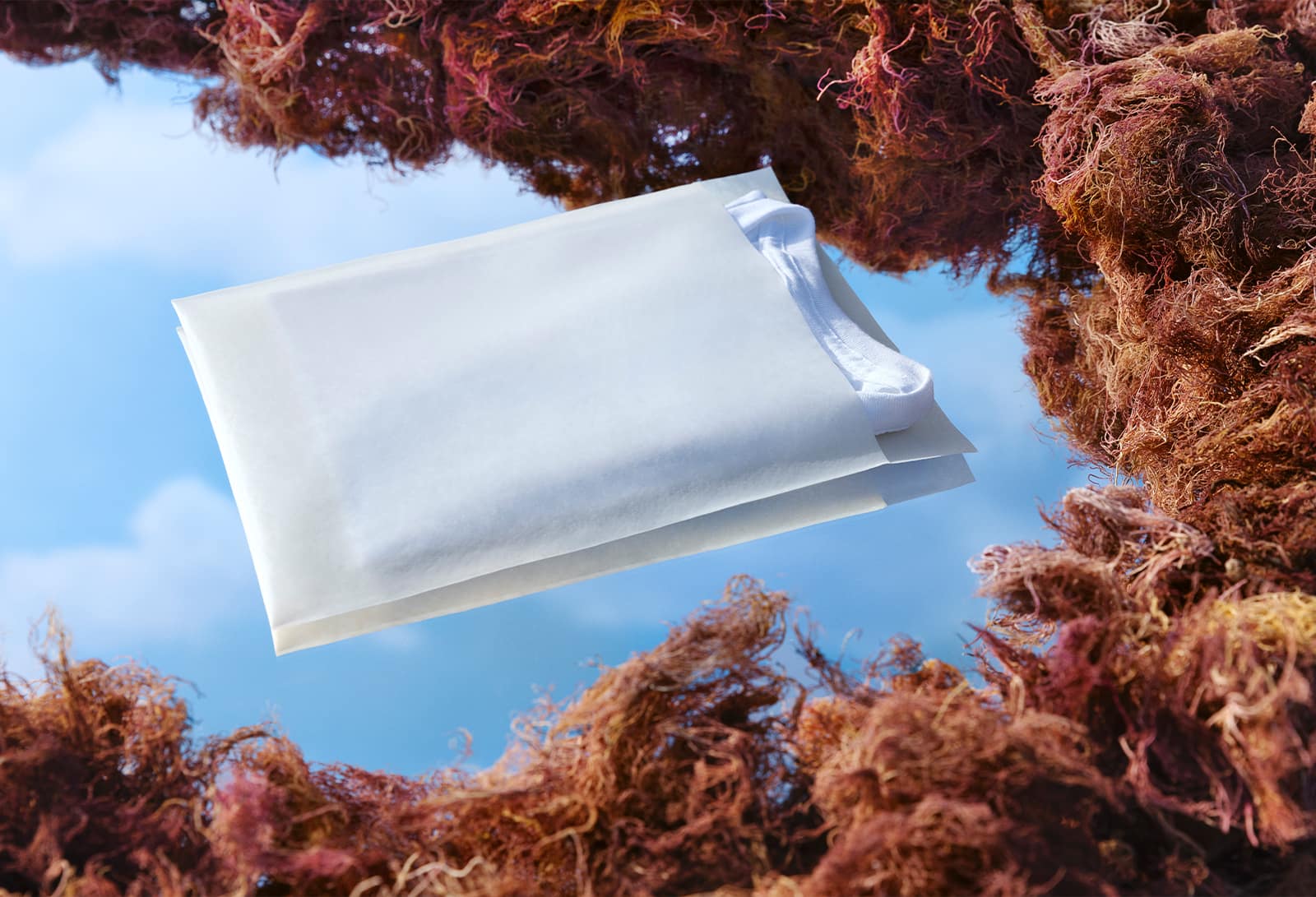California-based start-up Sway has officially debuted its breakthrough technology for biopolymer resins to replace flexible plastics. The patent-pending thermoplastic seaweed resin, named TPSea, is microplastic-free, home compostable, and 100% biobased.
After closing a $5 million seed round in February 2024 led by Third Nature Investments and backers including BAM Ventures, and winning the Tom Ford Plastic Innovation Prize in 2023, an exciting new chapter lies ahead this year, with the brand finally able to apply its technology at scale.
“Clean oceans, abundant biodiversity, and thriving coastal economies all intertwine with Sway’s success as we accelerate production in 2024,” says Julia Marsh, CEO and co-founder of Sway. “We believe everyday materials should help to replenish the planet from sea to soil. The launch of our thermoplastic seaweed materials, along with an influx of new capital targeted at scaling production, signifies tangible progress toward a more circular future.”
Due to its ability to mesh seamlessly with the current plastic manufacturing systems on offer, TPSea is easily scalable. The material also serves as the basis for TPSea Flex, a film solution to replace plastic bags, wrappers, and pouches across industries. The packaging applications, which can be made using TPSea, represent 30% of single-use plastic packaging. With 400 million tons of new plastic created annually, replacing them with TPSea would have immense economic impact. The seaweed its made of is a zero-input crop that can sequester 20 times more carbon per acre than trees. With the global seaweed markets expected to grow by $11.8 billion by 2030, it also shows huge economic potential.
While the company has tested the material with fashion brands like J.Crew and Burton, it has yet to apply its offerings to beauty, although the possibility is certainly on the horizon. “We’re thrilled to see Sway’s steady progression toward market-scale production that will empower brands like ours to transition into next-generation materials," comments Doug Forster, Chief Sourcing Officer at J.Crew.
Fashion brands aren’t the only brands Sway is partnering with: sustainable packaging supplier EcoEnclose helped co-launch the first seaweed-windowed retail box in January 2024. “Our expansive network of eco-conscious brands are always looking for restorative alternatives to today's mainstream packaging materials. We see this demand across all industries, from food to fashion to cosmetics,” says Saloni Doshi, CEO of EcoEnclose. “With tangible shifts in customer values, brand sustainability commitments, and packaging legislation, it’s clear that innovation leaders like Sway have a keen market ready to adopt their truly unique, thoughtfully produced, biobased materials.”
BeautyMatter spoke to Marsh about the importance of prioritizing compostability over recyclability and creating a system of responsible consumption.
How have initiatives such as winning the Tom Ford Plastic Innovation Prize and Beyond the Bag Challenge helped drive your business forward?
Winning first place in the Tom Ford Plastic Innovation Prize wasn't just a victory for Sway; it was validation that the biggest brands in the world want to see seaweed succeed. The prize was organized by leaders in fashion and beauty, including Tom Ford, Stella McCartney, J.Crew, and Nike. These partners gave Sway real-world context for how our seaweed materials could replace plastic at scale. More than that, the Prize facilitated material testing to answer complex questions, including “How does the material decompose in nature? What if a marine mammal ingests this packaging?” Of course we would never wish to see our materials end up in nature, but this type of testing (while time-consuming and costly) is critical in helping the Sway team to understand how our materials could behave in the real world.
What is the biggest space for adoption of TPSea within the beauty industry?
Packaging is the first invitation a beauty brand offers the shopper to engage with a product. Beautifully designed boxes, bottles, or tubes can inspire delight and could ultimately persuade a shopper to make a purchase. These materials are often made from traditional fossil-fuel– derived plastic and are not recyclable after use, leaving the shopper feeling guilty or frustrated.
We'd love to be a part of making even more positive packaging experiences. Unboxing your new cream or mascara should only bring joy! To start, Sway’s TPSea Flex film can help replace ubiquitous flexible plastics in beauty like wrappers, bags, and pouches. This category of packaging is oftentimes necessary to keep products protected, clean, or intact, but they are also overwhelmingly non-recyclable and end up in landfill or as litter. Our TPSea Flex film offers an alternative that is sourced from nature, which returns to nature. What’s more, beauty brands can share the story of seaweed, plastic-free solutions, healthy oceans, or even circularity to inspire the shopper and showcase their commitment to more responsible consumption.


What challenges does the cosmetics industry present when it comes to the adoption of compostable plastic alternatives?
Many cosmetics companies are pursuing recyclability and recyclable content as a higher-priority solution than compostable materials. This strategy is primarily based on ease, as well as the belief that recycling works—but we cannot recycle our way out of the plastic problem. In many cases, there are plenty of opportunities to introduce bio-based materials that return to nature after use. Polybags, retail bags, and pouches are great examples of materials which cannot be easily recycled, and could be replaced with Sway’s compostable seaweed packaging.
What are the biggest hurdles when it came to scaling this technology?
Plastics have been optimized over the course of a century. The manufacturing systems used to produce plastic are perfect, well-oiled machines. Plugging an entirely new material into these systems comes with quite a few challenges—the first being that plastics melt, and seaweed doesn't. That's why the Sway team is so excited about TPSea—our breakthrough technology that enables seaweed to melt and flow through traditional plastics equipment. Scale is already happening, much more quickly, within systems that are already incredibly efficient.
How would you describe your working partnership with your investors, what insights have you gained from them?
Sway is fortunate to have investors from a diversity of backgrounds, including oceans, fashion, agriculture, conservation, and design, in addition to business. When we seek support from our investors, they're able to support us in meaningful ways. Alante Capital, for instance, has built a network of fashion brands eager to work with innovative materials and has helped broaden our access to the broader material innovation community. Our investors at Conservation International Ventures provide us with invaluable guidance as we built our supply chain through the lens of ocean conservation and responsible seaweed cultivation. It's always about more than just the financial support.